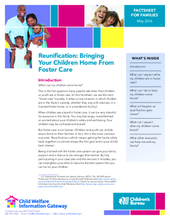This page contains documents and other resources related to children's care in the Americas. Browse resources by region, country, or category.
Displaying 2581 - 2590 of 3191
This report highlights the research on the disparities that exist between LGBTQ foster youth and their nonLGBTQ peers, as well as the compounding effects these factors have in relation to other intersecting factors including race, ethnicity, culture and language.
This Factsheet from the Child Welfare Information Gateway provides information for families who are reunifying after placement in foster care the US.
In this video from the BBC, Katy Watson tells the story of one mother and daughter who were able to reunite briefly during a 20-minute opening of the US-Mexico border in California.
ISS-USA is implementing a training in Guatemala on April 28-29th. This training is part of a project to provide coordinated cross border social services for children and families migrating in the Northern Triangle, Mexico, and the U.S.
On April 28, 2016, Equity for Children, in partnership with the Center for New York City Affairs, is organizing a conference with the support of the Fundacion Corona, the Van Leer Foundation, the Global Urban Future
The state of Indiana in the US has just opened the country’s first “baby boxes” at two fire stations in Northern Indiana, according to this article from Wyfi.
This paper examines whether policies that guide the termination of parental rights correspond to state adoption rate differences in the United States.
The purpose of this study was to determine the factors associated with the risk of negligence in child care during the first year of rearing in adolescent and adult mothers.
El objetivo de este estudio fue determinar los factores asociados al riesgo de negligencia en el cuidado del hijo durante el primer año de crianza en madres adolescentes y adultas.
According to recent estimates from Statistics Canada, nearly half of the children in foster care in Canada are aboriginal, and in Saskatchewan, the percentage of aboriginal children in the child welfare system is a staggering 85 percent, says this article from Global News.



